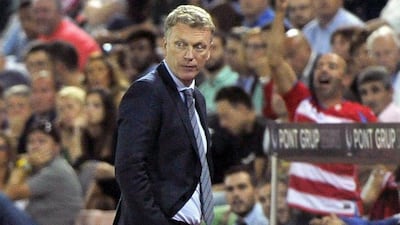David Moyes, the coach of Real Sociedad, hardly needs lessons in how suffocating a charged local derby can become for its participants.
Moyes played for Celtic, a club who share ownership of one of the fiercest local sporting rivalries in the world. He made his name in management with Everton, in an era when that club’s principal progress was assessed by many fans not by trophies but by their performances, at least twice a year, in matches against Liverpool.
Moyes appreciated soon after his appointment at Real, last November, the weight given by supporters of the San Sebastian club to fixtures against Athletic Bilbao. The clubs are the main, historic representatives of football in the Basque Country, an autonomous region in north-east Spain.
To stand for Basqueness is to stand for a great deal more than for a region. It is to stand for a sense of sovereignty.
Plenty of flags will be on show at Real's Anoeta Stadium on Sunday, but it would be surprising to see one in the yellow and red of Spain. Rather, the green, red and white colours of the ikurrina, the Basque flag, will be conspicuous.
Real and Athletic have a long argument about how best to represent their Basqueness. Athletic recruit and field only players who have a distinct connection to the region, either by birth or parentage. It is a brave strategy in a global sport where success is conventionally achieved with players drawn from all corners of the planet.
Foreign internationals do and have represented Athletic, but all of them have links to the region, such as Aymeric Laporte, the France international defender, who grew up in Athletic’s youth system and traces a Basque lineage through his great-grandparents.
Until the 1980s, Real did not employ players from outside the region. They then began to hire players from abroad, but few from parts of Spain outside the Basque Country, until they opened up their recruitment after the turn of the millennium. But a sense of locale is still important, which partly explains why the president, Jokin Aperribay, pushed so hard for the signature, at the end of the transfer window, of former Real Madrid midfielder Asier Illarramendi.
Illarramendi is from Mutriku, a town midway between San Sebastian and Bilbao, and came through the youth ranks at Real. He joined Madrid for more than €30 million (Dh122.9m) in 2013. But he never established a steady first-team place there and Real brought him home for around a third of the price for which they had sold him.
Illarramendi, 25, has given Sociedad extra bite in the centre of midfield. Moyes, who was relieved to gain his first victory of a difficult season, 3-0 away at Granada on Wednesday, approves of Illarramendi’s qualities, even if he might have preferred the outlay to have been spread around the hiring of two or more new players.
“You never get everything you want in the transfer market,” said Moyes, whose last job was at Manchester United. “You hope to strengthen, improve the team.”
Interest in the strikers Danny Ings, who went from Burnley to Liverpool, and Mohamed Salah, who joined AS Roma on loan from Chelsea, did not come to fruition and goals have been a problem for Real, although Imanol Agirretxe’s hat-trick against Granada has boosted morale ahead of the derby.
It also served to push Real above Athletic, who have lost four of their five Primera Liga matches, in the table.
Which of them finishes each campaign higher is taken as a measure of success or shortcomings for many Basque fans. But it will not become an obsession for the Scotsman in charge of the club currently two points ahead of their rivals.
“It’s important,” Moyes said, “but I don’t keep thinking about who we finish above.”
He oversaw a pair of 1-1 draws in the derbies last season, so he has yet to know the elation of a Real win against Athletic, or the noisy disappointment that follows a defeat.
sports@thenational.ae
Follow us on Twitter @NatSportUAE


